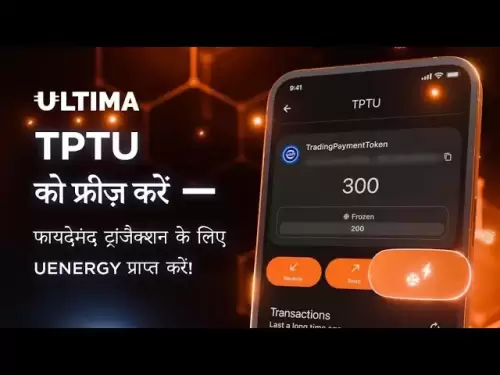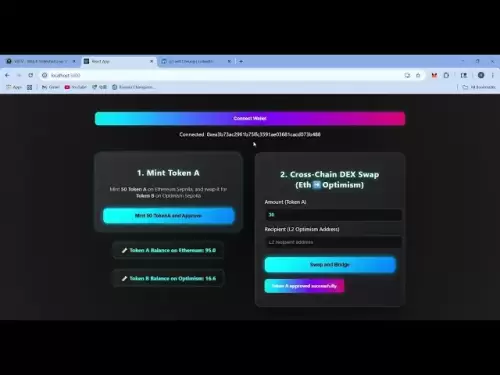-
 Bitcoin
Bitcoin $109,459.7682
2.44% -
 Ethereum
Ethereum $2,598.6052
6.29% -
 Tether USDt
Tether USDt $1.0003
0.00% -
 XRP
XRP $2.2734
3.95% -
 BNB
BNB $661.4886
1.58% -
 Solana
Solana $155.4825
4.35% -
 USDC
USDC $0.9999
-0.02% -
 TRON
TRON $0.2838
1.04% -
 Dogecoin
Dogecoin $0.1740
8.25% -
 Cardano
Cardano $0.6047
9.04% -
 Hyperliquid
Hyperliquid $40.2302
6.50% -
 Sui
Sui $2.9863
10.05% -
 Bitcoin Cash
Bitcoin Cash $509.5786
0.60% -
 Chainlink
Chainlink $13.8156
6.03% -
 UNUS SED LEO
UNUS SED LEO $9.0142
0.69% -
 Avalanche
Avalanche $19.0337
8.68% -
 Stellar
Stellar $0.2438
5.17% -
 Toncoin
Toncoin $2.9012
3.59% -
 Shiba Inu
Shiba Inu $0.0...01210
6.20% -
 Litecoin
Litecoin $90.0882
7.05% -
 Hedera
Hedera $0.1597
8.53% -
 Monero
Monero $326.3340
2.88% -
 Polkadot
Polkadot $3.6365
9.32% -
 Bitget Token
Bitget Token $4.6162
2.72% -
 Dai
Dai $1.0001
0.00% -
 Ethena USDe
Ethena USDe $1.0002
-0.01% -
 Uniswap
Uniswap $7.6403
10.47% -
 Pepe
Pepe $0.0...01060
12.03% -
 Aave
Aave $281.3664
7.56% -
 Pi
Pi $0.4992
1.76%
How to import and export Dogecoin wallet addresses?
Dogecoin addresses aren't imported/exported; access is managed via private keys or seed phrases, crucial for security. Wallet types (software, hardware, web, paper) determine how addresses are accessed and managed. Never share your keys!
Mar 16, 2025 at 05:01 am
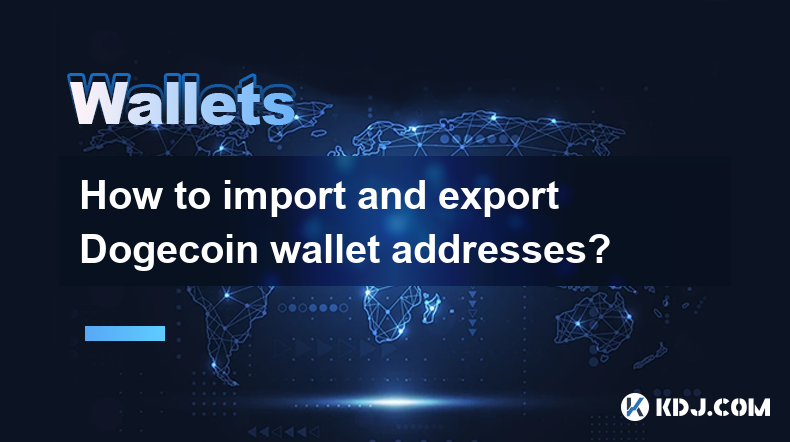
Key Points:
- Dogecoin wallet addresses are not directly "imported" or "exported" like files. Instead, you manage access to your Dogecoin through your private keys or seed phrase.
- The process depends entirely on the type of Dogecoin wallet you are using. Different wallets have different methods for accessing and managing your addresses.
- Security is paramount. Never share your private keys or seed phrase with anyone.
Understanding Dogecoin Wallet Addresses
A Dogecoin wallet address is essentially your unique identifier on the Dogecoin blockchain. It's a long string of alphanumeric characters used to receive DOGE. Unlike traditional bank accounts, you don't "import" or "export" these addresses. You gain access to the funds associated with the address through your private keys or seed phrase, which act as digital signatures. Losing these keys means losing access to your Dogecoin.
Managing Addresses in Different Wallet Types
The methods for managing your Dogecoin addresses vary greatly depending on the type of wallet you're using. Let's explore some common types:
- Software Wallets: These are applications installed on your computer or mobile device. They typically generate new addresses automatically when you receive Dogecoin. You don't explicitly "import" or "export" addresses, but you can usually view a list of your addresses within the wallet's interface. Backing up your wallet's seed phrase is crucial for regaining access if your device is lost or damaged.
- Hardware Wallets: These are physical devices that store your private keys offline. They provide enhanced security. Similar to software wallets, you don't import or export addresses directly. You'll see a list of addresses generated by the hardware wallet, and you can use those to receive DOGE. The hardware wallet itself needs to be securely stored.
- Web Wallets: These are online wallets accessed through a browser. They're convenient but generally less secure than software or hardware wallets. Again, you don't import or export addresses; they are managed by the web wallet service provider. Security relies heavily on the platform's security measures and your account password. It's essential to choose a reputable provider.
- Paper Wallets: These are essentially printed documents containing your public and private keys. You don't import or export addresses in the traditional sense. The paper wallet itself is the record of your addresses and keys. Safeguarding the paper wallet is critical, as physical loss or damage means loss of access to your funds.
Accessing and Viewing Your Dogecoin Addresses
Most wallets provide a clear way to view your Dogecoin addresses. Typically, this involves navigating to a section labeled "Addresses," "Receive," or something similar within the wallet's interface. The process might differ slightly depending on the specific wallet software.
- Software Wallet Example: In many software wallets, you'll find a "Receive" button. Clicking this will generate a new address (or show you your existing addresses) for receiving Dogecoin.
- Hardware Wallet Example: Your hardware wallet will display addresses on its screen or through its accompanying software. You'll usually be able to generate new addresses as needed.
- Web Wallet Example: Web wallets typically show your existing addresses on your account dashboard. They may also allow you to generate new ones.
Understanding Private Keys and Seed Phrases
Your private keys and seed phrase are the critical elements for controlling your Dogecoin. They are not the addresses themselves, but they grant you access to the Dogecoin associated with the addresses. Never share these with anyone, as doing so would give them complete control over your funds.
- Private Keys: These are long, unique cryptographic keys associated with each Dogecoin address. They are used to sign transactions, proving you own the Dogecoin.
- Seed Phrase (or Recovery Phrase): This is a list of words that acts as a master key to your wallet. It can be used to recover access to your wallet and all associated addresses if you lose access to your device or software. Always store your seed phrase securely and offline, ideally in a physical location separate from your electronic devices.
Security Best Practices
- Strong Passwords: Use strong, unique passwords for all your cryptocurrency wallets.
- Two-Factor Authentication (2FA): Enable 2FA whenever possible to add an extra layer of security.
- Regular Backups: Regularly back up your wallet's seed phrase or private keys to a secure location.
- Reputable Wallets: Only use reputable and well-established wallets from trusted sources.
- Offline Storage: Store your seed phrases and private keys offline to protect against hacking.
Frequently Asked Questions
Q: Can I transfer Dogecoin from one address to another?
A: Yes, you can transfer Dogecoin between different addresses that you control, using the private keys associated with the sending address.
Q: What happens if I lose my private keys?
A: If you lose your private keys or seed phrase, you will lose access to your Dogecoin. There's no way to recover them.
Q: Can I import my Dogecoin addresses from one wallet to another?
A: You don't import addresses themselves. You import your private keys or seed phrase, which gives you access to the addresses and the Dogecoin associated with them. This process is wallet-specific.
Q: Are all Dogecoin addresses the same length?
A: Yes, Dogecoin addresses are typically 34 characters long and begin with a 'D'.
Q: Is it safe to use a web wallet for Dogecoin?
A: Web wallets offer convenience but present a higher security risk compared to software or hardware wallets because your private keys are stored online. Use caution and only choose reputable providers.
Q: What should I do if I suspect my Dogecoin wallet has been compromised?
A: Immediately change your password, contact your wallet provider (if applicable), and secure your funds by transferring them to a new, secure wallet. Monitor your transactions closely.
Disclaimer:info@kdj.com
The information provided is not trading advice. kdj.com does not assume any responsibility for any investments made based on the information provided in this article. Cryptocurrencies are highly volatile and it is highly recommended that you invest with caution after thorough research!
If you believe that the content used on this website infringes your copyright, please contact us immediately (info@kdj.com) and we will delete it promptly.
- Crypto Summer Buys: Is Shiba Inu Out, and What's In?
- 2025-07-03 18:30:12
- Bitcoin, Solaris Presale, and Coin Watch: Catching the Next Wave
- 2025-07-03 19:10:11
- BONK ETF Buzz: Catalyst for a Meme Coin Moonshot?
- 2025-07-03 19:50:12
- Sui Coin, Bitcoin Solaris, and the Presale Opportunity: Catching the Next Wave
- 2025-07-03 19:50:12
- Sui Coin, Bitcoin Solaris, and Presale Opportunities: What's the Buzz?
- 2025-07-03 19:55:14
- MEXC's Bitcoin Reserves: A Fortress of Asset Coverage
- 2025-07-03 19:55:14
Related knowledge

How to cancel a pending transaction in Phantom wallet?
Jul 03,2025 at 07:21pm
Understanding Pending Transactions in Phantom WalletA pending transaction in the Phantom wallet occurs when a user initiates a transfer or interaction with the Solana blockchain, but it hasn't yet been confirmed by the network. This can happen due to various reasons such as low transaction fees, network congestion, or incorrect gas settings. It's import...

How to lock my Phantom wallet extension?
Jul 03,2025 at 11:14am
What Is the Phantom Wallet and Why Lock It?The Phantom wallet is a popular non-custodial cryptocurrency wallet designed for interacting with the Solana blockchain. Supporting both browser extensions and mobile apps, Phantom allows users to store, send, receive, and stake SOL tokens, as well as interact with decentralized applications (dApps). Securing y...

Does Phantom wallet offer two-factor authentication (2FA)?
Jul 03,2025 at 09:00am
Understanding Phantom Wallet and Its Security FeaturesPhantom wallet is a widely used non-custodial cryptocurrency wallet that supports the Solana blockchain. It allows users to store, send, receive, and interact with decentralized applications (dApps) seamlessly. As security is a top priority for any crypto wallet user, security features like two-facto...

What is "rent" on Solana and how does it affect my Phantom wallet?
Jul 02,2025 at 08:35pm
Understanding 'Rent' on SolanaIn the context of Solana, the term 'rent' refers to a storage fee that users pay for maintaining data on the blockchain. Unlike Ethereum, where storage costs are paid once via gas fees during contract deployment, Solana implements a recurring cost model to ensure efficient usage of network resources. This means that any acc...
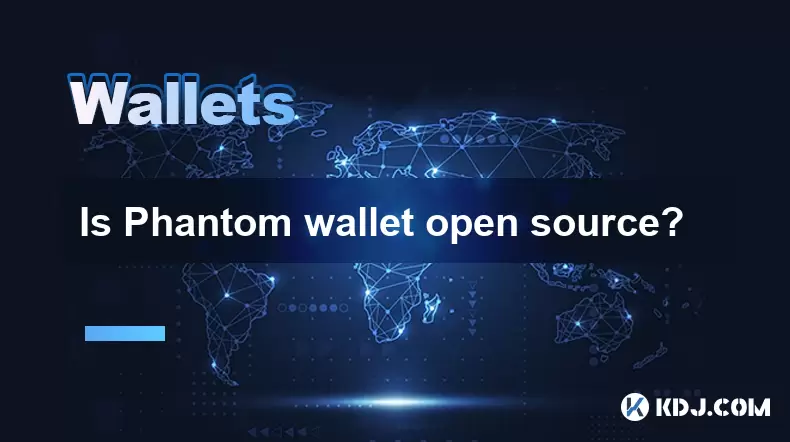
Is Phantom wallet open source?
Jul 03,2025 at 12:29am
What is Phantom Wallet?Phantom wallet is a non-custodial cryptocurrency wallet primarily designed for the Solana blockchain. It allows users to store, send, receive, and interact with decentralized applications (dApps) on the Solana network. The wallet is available as a browser extension and mobile application, offering a seamless experience for both be...
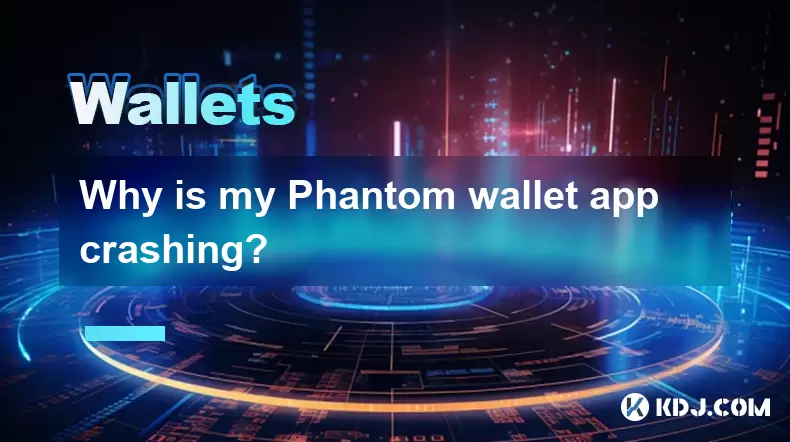
Why is my Phantom wallet app crashing?
Jul 02,2025 at 07:35pm
Understanding Phantom Wallet App CrashesIf you're experiencing issues with the Phantom wallet app crashing, you're not alone. Many users have reported similar problems, especially during high network activity or after recent updates. Phantom is a popular Solana-based wallet that allows users to store, send, and receive SOL tokens as well as interact wit...

How to cancel a pending transaction in Phantom wallet?
Jul 03,2025 at 07:21pm
Understanding Pending Transactions in Phantom WalletA pending transaction in the Phantom wallet occurs when a user initiates a transfer or interaction with the Solana blockchain, but it hasn't yet been confirmed by the network. This can happen due to various reasons such as low transaction fees, network congestion, or incorrect gas settings. It's import...

How to lock my Phantom wallet extension?
Jul 03,2025 at 11:14am
What Is the Phantom Wallet and Why Lock It?The Phantom wallet is a popular non-custodial cryptocurrency wallet designed for interacting with the Solana blockchain. Supporting both browser extensions and mobile apps, Phantom allows users to store, send, receive, and stake SOL tokens, as well as interact with decentralized applications (dApps). Securing y...

Does Phantom wallet offer two-factor authentication (2FA)?
Jul 03,2025 at 09:00am
Understanding Phantom Wallet and Its Security FeaturesPhantom wallet is a widely used non-custodial cryptocurrency wallet that supports the Solana blockchain. It allows users to store, send, receive, and interact with decentralized applications (dApps) seamlessly. As security is a top priority for any crypto wallet user, security features like two-facto...

What is "rent" on Solana and how does it affect my Phantom wallet?
Jul 02,2025 at 08:35pm
Understanding 'Rent' on SolanaIn the context of Solana, the term 'rent' refers to a storage fee that users pay for maintaining data on the blockchain. Unlike Ethereum, where storage costs are paid once via gas fees during contract deployment, Solana implements a recurring cost model to ensure efficient usage of network resources. This means that any acc...

Is Phantom wallet open source?
Jul 03,2025 at 12:29am
What is Phantom Wallet?Phantom wallet is a non-custodial cryptocurrency wallet primarily designed for the Solana blockchain. It allows users to store, send, receive, and interact with decentralized applications (dApps) on the Solana network. The wallet is available as a browser extension and mobile application, offering a seamless experience for both be...

Why is my Phantom wallet app crashing?
Jul 02,2025 at 07:35pm
Understanding Phantom Wallet App CrashesIf you're experiencing issues with the Phantom wallet app crashing, you're not alone. Many users have reported similar problems, especially during high network activity or after recent updates. Phantom is a popular Solana-based wallet that allows users to store, send, and receive SOL tokens as well as interact wit...
See all articles





















